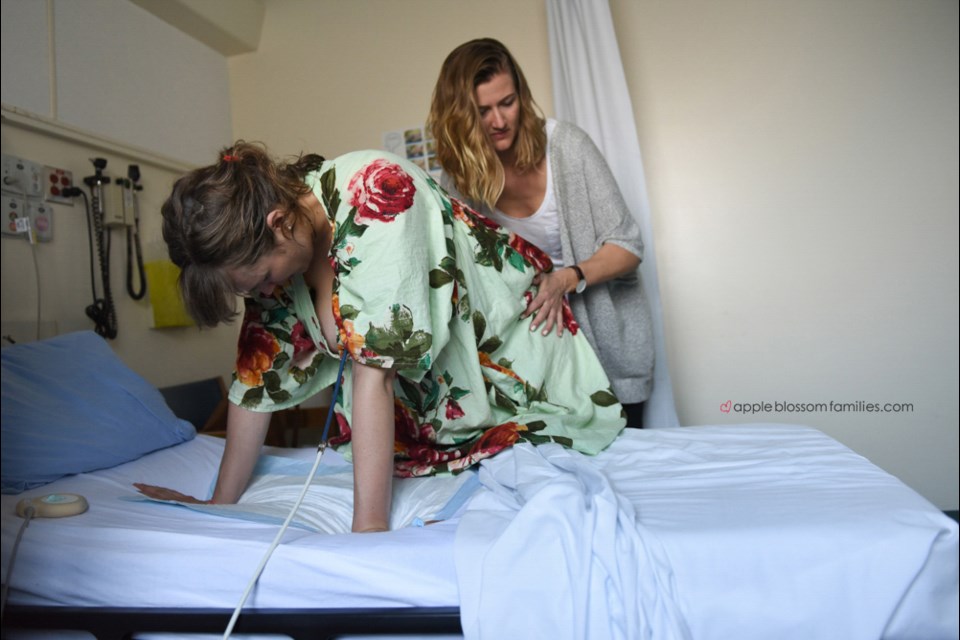When it comes to childbirth, having one-on-one support can make all the difference in the world for a mother-to-be — especially with the current strain on B.C.’s hospital system.
Morag Hastings knows how hard it can be for overworked health-care professionals to offer physical and emotional support to women in labour. That’s where she comes in.
Hastings is a doula and the owner of Dancing Star Birth, which provides prenatal classes, doula services and birth photographers for families across Metro Vancouver. She’s hosting an event next week to introduce Lower Mainland residents to doulas: Speed Dating with Doulas.
Anyone from Metro Vancouver, at any stage of pregnancy, is invited to register to attend the online session on Thursday, June 29.
Families will get 15-minute sessions with different doulas over the course of the evening; Hastings will pre-screen those who register so she can try to narrow the “dates” down to the best matches, depending on a person’s particular needs and wishes.
“The clients don’t have to go and research a bunch of doulas and see if they fit and then contact everyone,” Hastings said. “They can show up to the event. It’s free. They don’t have to leave their home, and they can meet somewhere between four and six doulas. If they want to hire one, they can; if they don’t feel like they’ve found a good fit or a good match, they don’t have to. But at least they have the experience of meeting a bunch of doulas, and they’ll have a better sense of what they’re looking for when they go to look for a doula who would be suitable for them.”
So what, exactly, does a doula do?
Essentially, Hastings explains, a doula is an extra person who’s there to be of service to the family.
“So if you need backrubs for 10 hours, you get backrubs for 10 hours. If your partner needs to go out and get some fresh air, they can leave and you’re still getting your backrubs,” she says. “It takes a lot of pressure off the nursing staff.”
Doulas, unlike midwives and other health-care professionals, don’t need to have hospital privileges, so they can accompany clients to any hospital in the Lower Mainland. Hastings’ team works in Vancouver and surrounding areas of Metro Vancouver, all the way out to Surrey and Langley and up to Squamish.
At some hospitals, such as B.C. Women’s, doulas are well integrated into the regular work of labour and delivery wards and are considered part of the medical team, she noted.
“Doulas at B.C. Women’s are pretty incorporated into the system. We go into the OR, we’re allowed into the rooms. They almost expect people to have doulas, and they rely on us,” she said.
Hastings said doulas can be particularly helpful at large, busy hospitals such as Royal Columbian in New Westminster.
“Royal Columbian is a very, very busy hospital. It’s very valuable to show up when you’re in true, active labour, so having a doula on board and somebody to support you through what that process looks like can be very valuable,” she said.
At smaller hospitals, such as Burnaby, a doula may be important for pain management, since those hospitals often don’t have an anesthesiologist on site.
“Maybe you just need somebody there to give you extra hip squeezes or extra support while you’re waiting to get your medication, or maybe you choose not to have medication and you want to have someone specifically there to give you that added support,” she explained.
Hastings pointed out there’s not a regulatory agency for doulas as there is for midwives, so there’s no prescribed training. That means prospective clients need to do their own research to find out what their doula’s training is and what services they offer. Some, for instance, may also be massage therapists or birth photographers.
“The benefit to using the speed dating is that I’ve already vetted a lot of people,” explained Hastings, noting she sends clients an information sheet that covers information about the doulas, their background, their training and experience, and their fees.
Generally, she said, doulas in Metro Vancouver will charge anywhere from $800 to more than $2,000 for a birth, depending on their experience and what they include in their doula package.
From Hastings’ perspective, it’s money well spent.
Those who use doulas tend to stay at home until later stages of labour, making it less likely they’ll be sent away from the hospital or diverted to another facility when they arrive. Doula-assisted births are also less likely to see the use of medication, less likely to end up in Cesarean sections and more likely to see shorter hospital stays, she noted. (She offered up a link to the Evidence Based Birth site for those who want to read more about the evidence for the benefit of doulas.)
All of those factors are a benefit to the health-care system and to the clients they serve, Hastings noted.
Anyone who wants to find out more about doulas is invited to take part in the June 29 speed dating session. If June 29 is too early, prospective clients can sign up for future sessions in August and beyond, since the events run every six weeks to two months.
More information and registration is available at the Dancing Star Birth website.
Follow Julie MacLellan on Twitter @juliemaclellan.
Email Julie, [email protected]



